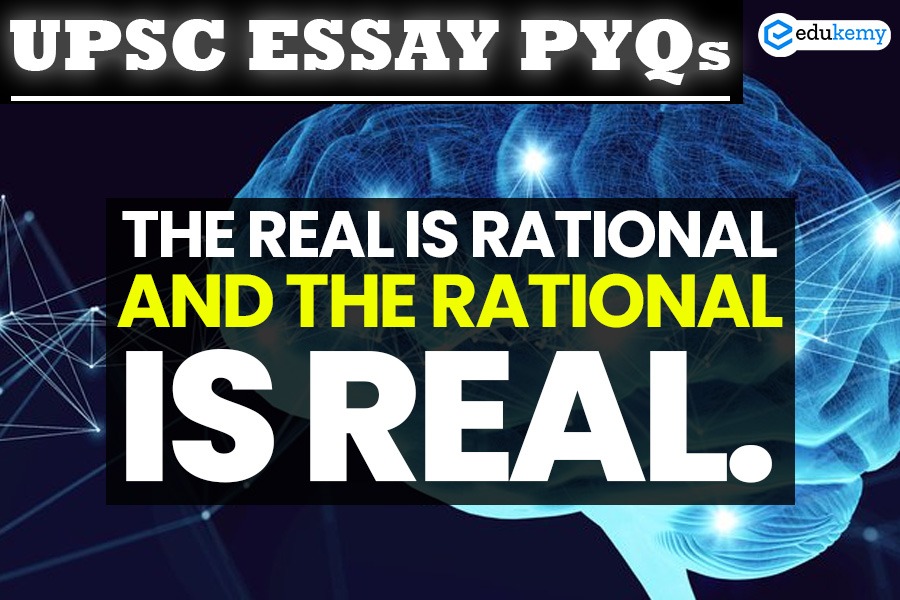2.1K

Explore the link between reality and rationality in philosophy for UPSC Essay PYQ 2021 with examples from science, ethics, and cognition.
Contents
Essay Key
| Component | Details |
|---|---|
| Essay Topic | The real is rational and the rational is real |
| Paraphrase | This essay explores the philosophical idea that reality can be grasped through rational thinking, and that rational concepts are ultimately realized in the real world. |
| Intent of the Essay | To examine how rational thinking influences our perception of reality and how real-life experiences reinforce rational ideas. |
| Keywords | Reality, Rationality, Philosophy, Idealism, Realism |
Key Arguments
1. Understanding the Nature of Reality
- Reality is typically viewed as something that exists independently of human thought.
- However, our understanding of it is filtered through rational frameworks.
- Human cognition plays a vital role in shaping how we perceive and interact with reality.
- Evidence/Data: Philosophers like Hegel asserted that reality unfolds through rational processes.
2. Rationality as a Lens to Comprehend Reality
- Rational thought helps individuals understand and navigate the complexities of the world.
- Rationalism claims that reason is the primary source of knowledge, enabling deeper insights into real phenomena.
- Evidence/Data: Scientific breakthroughs over history reflect how rational inquiry has advanced our understanding of the universe.
3. Idealism vs. Realism: A Philosophical Dialogue
- The tension between idealism and realism lies in how ideas and actual experiences interact.
- Rational concepts (ideals) often take shape through real-world manifestations.
- Evidence/Data: Immanuel Kant emphasized that rational ideas gain value when grounded in empirical experience.
4. Ethical Reasoning in Real-World Contexts
- Ethical frameworks based on rationality must be relevant to real-life situations.
- Rational moral choices are often evaluated by their practical consequences.
- Evidence/Data: Utilitarianism demonstrates how rationality helps assess outcomes to guide ethical decisions.
5. Cognitive Science and the Construction of Reality
- Cognitive psychology explores how rational thought influences our understanding of reality.
- Despite its strengths, human rationality is limited and susceptible to cognitive biases.
- Evidence/Data: These biases can distort perception, emphasizing the importance of critical thinking.
Case Studies/Examples
| Case Study | Key Insights | Relevance |
|---|---|---|
| Quantum Mechanics | Challenges classical notions of reality through rational mathematical frameworks. | Illustrates the merging of the rational and the real at the quantum level. |
| Economic Theories | Rational models explain market behaviors, but economic crises reveal their limitations when faced with real-world complexities. | Highlights the gaps between rational economic predictions and actual market behavior. |
| Ethical Dilemmas in AI | Rational algorithms guide decision-making in technology, but ethical outcomes must reflect real human values. | Demonstrates the need for the intersection of rationality and reality in technological advancements. |

Additional Tips
- Explore both historical and modern philosophical debates to deepen the analysis of rationality and its connection to reality.
- Integrate viewpoints from different philosophical schools and traditions for a well-rounded understanding of the subject.
- Reflect on how progress in science and technology influences our perception of reality and the use of rational thinking.
- Examine how cultural backgrounds shape interpretations of rationality and reality, as diverse cultures may view the same concepts differently.

